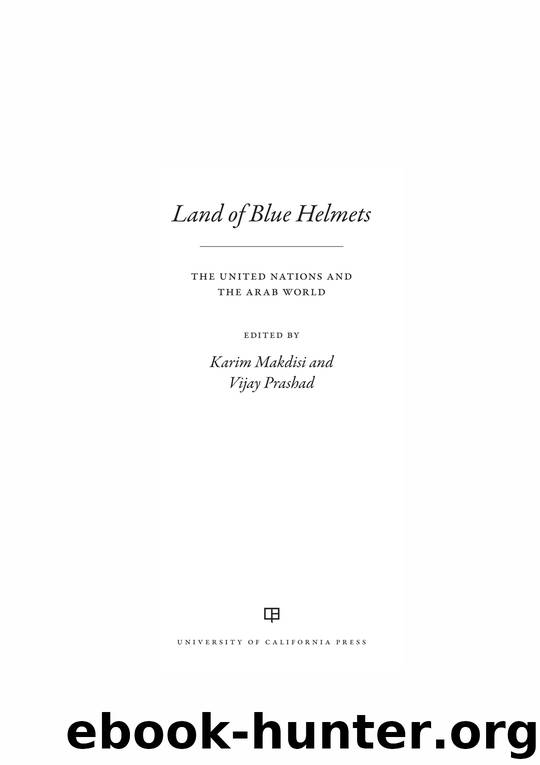Land of Blue Helmets by Karim Makdisi

Author:Karim Makdisi
Language: eng
Format: epub
ISBN: 9780520286931
Publisher: University of California Press
THE ROLE OF CIVIL SOCIETY
Civil society organizations at the national, regional, and international levels have worked toward holding states accountable for their actions in the human rights field; it is their raison d’être. For the past four decades, national, regional, and international NGOs have been submitting shadow reports to the treaty bodies and meeting with the mandate holders appointed by the Human Rights Council. They have taken advantage of the space opened up by the UPR process and have engaged actively with the review of each of the states. In the absence of democratic participation, effective judicial recourse, and access to influence domestic policy within their own countries, the UN becomes a crucially important forum where civil society hopes for pressure to bear on governments.
Between 2004 and 2009, national NGOs within the region made 66 submissions to nine treaty bodies, more than a third of which were to the CEDAW committee and the Committee on the Rights of the Child alone.53 For the four years of the first cycle of the UPR, national NGOs offered 192 organizational and joint submissions to the UPR process for ten Arab countries only. Further evidence of the increasing engagement and growing importance of NGOs in the UPR process is that for four of the countries that have undergone a second cycle of the UPR, NGO submissions nearly doubled, from 35 in the first cycle to 60 in the second.54
In the first cycle of the UPR review processes, the end of which coincided with the beginning of the revolts in 2011, national and regional NGOs demonstrated the highest concern with the status of civil and political rights in the region, followed immediately by economic, social, and cultural rights and administration of justice and recourse issues. They also advocated for improvements in women’s rights and the protection of vulnerable groups, including migrants, refugees, and stateless persons.55
Put together, the freedoms of opinion and conscience, expression, and association topped the list of issues of concern for national and regional organizations. These are all rights essential for civic participation in public life, without which any kind of democratic practice is simply not possible. Their comments and recommendations ranged from freedom of the press and imprisonment of journalists to publication and censorship laws and Internet freedoms, including blogs, website blocking, and free access to information. National and international NGOs both identified this as the highest priority in this set of rights. Arab NGOs also noted concerns with most of the specific economic and social rights far more often than international NGOs did, on average more than 4.5 times the frequency. Topping the list were generalized references to economic and social rights, social security and issues of poverty and an adequate standard of living, and housing rights. Most of those comments were aimed at countries that are large in populations and poorer in resources.56 Concerns with the rights of children were evident in the comments of all civil society organizations. The comments spanned a range of issues from child labor to education to child victims of trafficking and children of migrants and disadvantaged communities.
Download
This site does not store any files on its server. We only index and link to content provided by other sites. Please contact the content providers to delete copyright contents if any and email us, we'll remove relevant links or contents immediately.
| Automotive | Engineering |
| Transportation |
Whiskies Galore by Ian Buxton(41984)
Introduction to Aircraft Design (Cambridge Aerospace Series) by John P. Fielding(33115)
Small Unmanned Fixed-wing Aircraft Design by Andrew J. Keane Andras Sobester James P. Scanlan & András Sóbester & James P. Scanlan(32788)
Craft Beer for the Homebrewer by Michael Agnew(18233)
Turbulence by E. J. Noyes(8040)
The Complete Stick Figure Physics Tutorials by Allen Sarah(7362)
Kaplan MCAT General Chemistry Review by Kaplan(6925)
The Thirst by Nesbo Jo(6924)
Bad Blood by John Carreyrou(6610)
Modelling of Convective Heat and Mass Transfer in Rotating Flows by Igor V. Shevchuk(6431)
Learning SQL by Alan Beaulieu(6276)
Weapons of Math Destruction by Cathy O'Neil(6261)
Man-made Catastrophes and Risk Information Concealment by Dmitry Chernov & Didier Sornette(6001)
Digital Minimalism by Cal Newport;(5747)
Life 3.0: Being Human in the Age of Artificial Intelligence by Tegmark Max(5542)
iGen by Jean M. Twenge(5408)
Secrets of Antigravity Propulsion: Tesla, UFOs, and Classified Aerospace Technology by Ph.D. Paul A. Laviolette(5364)
Design of Trajectory Optimization Approach for Space Maneuver Vehicle Skip Entry Problems by Runqi Chai & Al Savvaris & Antonios Tsourdos & Senchun Chai(5062)
Pale Blue Dot by Carl Sagan(4995)
